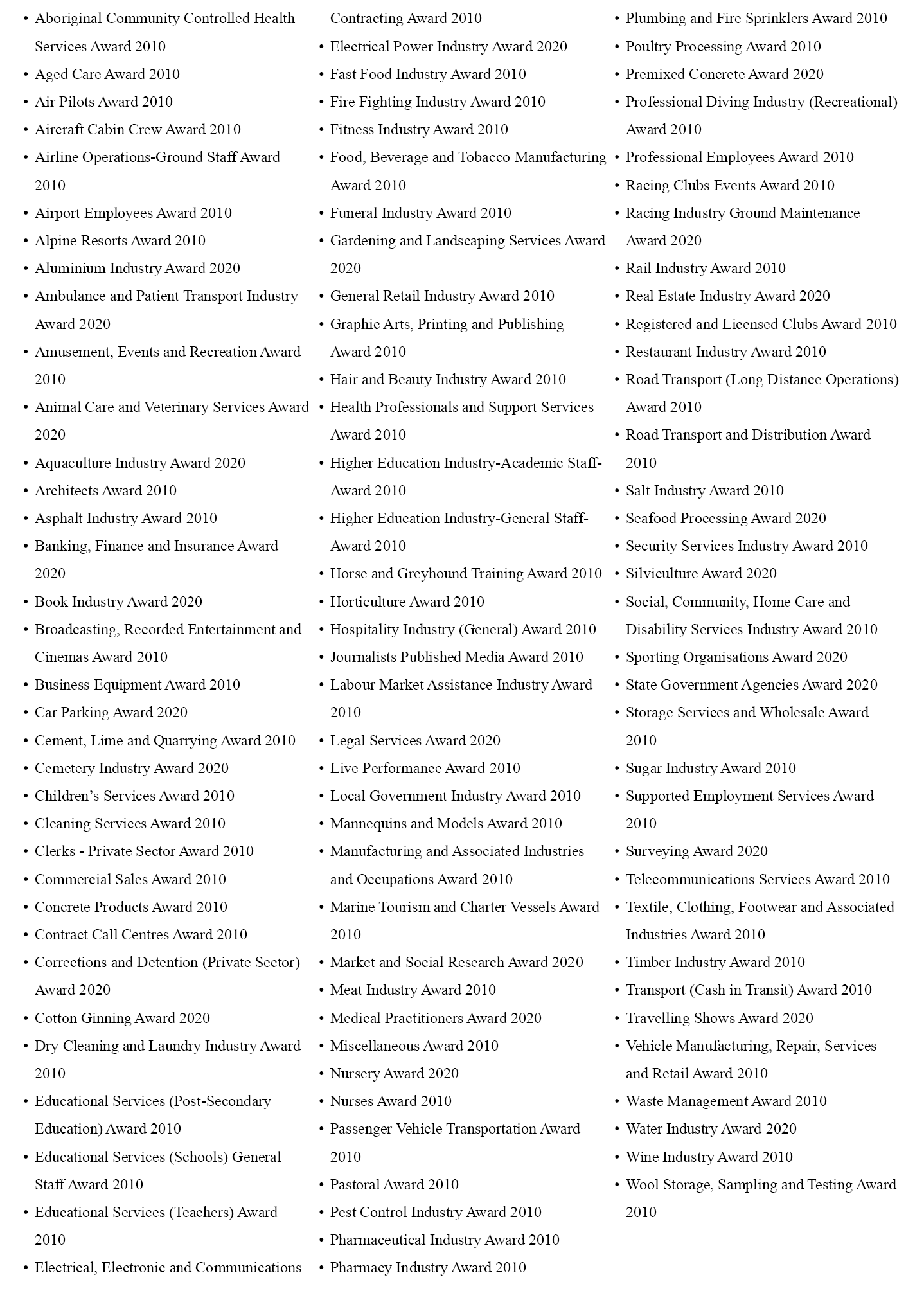02 April 2020
6 min read
#Workplace Relations & Safety, #COVID-19
Published by:

On 1 April 2020, the Fair Work Commission (Commission) announced its proposal to vary certain modern awards by inserting a new “Schedule X” containing additional measures to assist employers and employees during the COVID-19 pandemic.
The 103 modern awards nominated by the Commission to be amended are set out at the end of this article.
The awards will be varied to provide:
These amendments will only be operational until 30 June 2020.
The Commission is making these amendments to ensure the selected modern awards achieve their objective of providing a fair and relevant minimum safety net of terms and conditions.
There will be two versions of the proposed Schedule X:
The first version of Schedule X will:
The second version of the schedule will omit the provision for annual leave at half pay and will be inserted into the Hospitality Award, Clerks-Private Sector Award and the Restaurant Award, being awards which have recently been varied by the full bench of the Commission.
We note the proposed amendments do not prevent the modern awards from being further amended at a later date for additional pandemic coping measures.
The matter will be determined without a hearing if no opposing submissions are lodged.
If you intend to file a submission opposing or supporting the provisional views, you will need to lodge your submissions with the Commission by 4:00pm, Monday 6 April 2020.
The matter will proceed to a hearing if any opposing submissions are filed.
If you require any assistance in preparing a submission for the above proposed amendments, we can assist you.
However, we understand the proposed amendments will be helpful to both employees and employers and provide much needed flexibility for coping with the unprecedented COVID-19 pandemic.
The Commission seeks to amend the following awards:

The Commission has proposed for the following awards not to be affected by these amendments.

The Commission encourages the industrial parties in these sectors to enter into discussions about measures to respond to the impacts of the COVID-19 pandemic.
The proposed provisions for unpaid pandemic leave and annual leave at half pay are set out below.
X.2.1 Unpaid pandemic leave
Clause X.2.1(a) – subject to clauses X.2.1(b) and (c), any employee may elect to take up to two weeks’ unpaid leave if the employee is required, by government or medical authorities or acting on medical advice, to self-isolate or is otherwise prevented from working by measures taken by government or medical authorities in response to the COVID-19 pandemic in circumstances where the employee is required to work at premises operated by an employer.
Clause X.2.1(b) – the employee must give their employer notice of taking leave under clause X.2.1(a) and the reason the employee requires the leave, as soon as practicable (which may be a time after the leave has started).
Clause X.2.1(c) – an employee who has given their employer notice of taking leave under clause X.2.1(a) must, if required by the employer, give the employer evidence that would satisfy a reasonable person that the leave is taken for a reason given in clause X.2.1(a).
Clause X.2.1(d) – leave taken under clause X.2.1(a) does not affect any other paid or unpaid leave entitlement of the employee and counts as service for the purposes of entitlements under this Award and the National Employment Standards.
Note 1: A employee covered by this Award who is entitled to the benefit of clause X.2.1 has a workplace right under section 341(1)(a) of the Act.
Note 2: Under section 340(1) of the Act, an employer must not take adverse action against an employee because the employee has a workplace right, has or has not exercised a workplace right, or proposes or does not propose to exercise a workplace right, or to prevent the employee exercising a workplace right. Under section 342(1) of the Act, an employer takes adverse action against an employee if the employer dismisses the employee, injures the employee in his or her employment, alters the position of the employee to the employee’s prejudice, or discriminates between the employee and other employees of the employer.
Note 3: Under section 343(1) of the Act, a person must not organise or take, or threaten to organise or take, action against another person with intent to coerce the person to exercise or not exercise, or propose to exercise or not exercise, a workplace right, or to exercise or propose to exercise a workplace right in a particular way.
X.2.2 Annual leave at half pay
Instead of an employee taking paid annual leave on full pay, the employee and their employer may agree to the employee taking twice as much leave on half pay.
Any agreement to take twice as much annual leave at half pay must be recorded in writing and retained as an employee record.
For example, instead of an employee taking one week’s annual leave on full pay, the employee and their employer may agree to the employee taking two weeks’ annual leave on half pay. In this example:
Note 1: A employee covered by this Award who is entitled to the benefit of clause X.2.2 has a workplace right under section 341(1)(a) of the Act.
Note 2: Under section 340(1) of the Act, an employer must not take adverse action against an employee because the employee has a workplace right, has or has not exercised a workplace right, or proposes or does not propose to exercise a workplace right, or to prevent the employee exercising a workplace right. Under section 342(1) of the Act, an employer takes adverse action against an employee if the employer dismisses the employee, injures the employee in his or her employment, alters the position of the employee to the employee’s prejudice, or discriminates between the employee and other employees of the employer.
Note 3: Under section 343(1) of the Act, a person must not organise or take, or threaten to organise or take, action against another person with intent to coerce the person to exercise or not exercise, or propose to exercise or not exercise, a workplace right, or to exercise or propose to exercise a workplace right in a particular way.
Authors: Michael Selinger & Declan Johnston
Disclaimer
The information in this publication is of a general nature and is not intended to address the circumstances of any particular individual or entity. Although we endeavour to provide accurate and timely information, we do not guarantee that the information in this newsletter is accurate at the date it is received or that it will continue to be accurate in the future.
Published by: